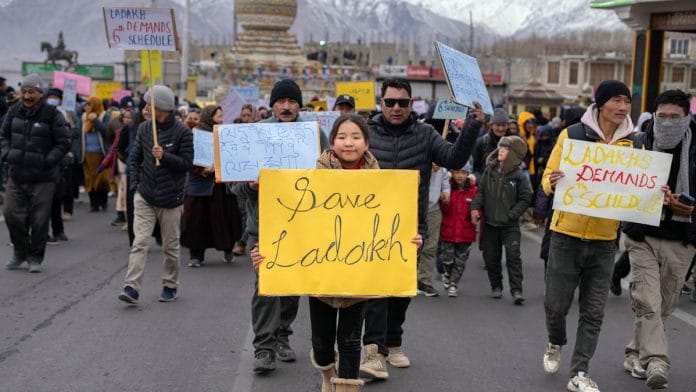New Delhi: Ensuring constitutional safeguards for Ladakhi people—a long-standing demand—the Union government Tuesday notified new reservation and domicile policies, giving them an 85 percent quota in government jobs.
Others, including central government officials posted there, will have to show that they have been residing in the UT continuously for 15 years from 31 October, 2019 to be considered “domiciles”.
One third of the seats in hill councils have been reserved for women. Additionally, the official languages of the UT will be regional languages, including Bhoti and Purg, besides English, Hindi and Urdu.
President Droupadi Murmu Tuesday notified the Union Territory of Ladakh Reservation (Amendment) Regulation, 2025, which amends the Jammu and Kashmir Reservation Act, 2004 in Ladakh’s context. This substitutes an earlier section in the 2004 Act, which pegged the reservation for local persons at 50 percent.
“The total percentage of reservation shall in no case exceed 85 percent, excluding reservation for Economically Weaker Sections (EWS),” the notification read.
Three other Regulations were notified by President Murmu—Ladakh Official Languages Regulation, 2025, Ladakh Civil Services Decentralisation and Recruitment (Amendment) Regulation, 2025, and Ladakh Autonomous Hill Development Councils (Amendment) Regulation, 2025.
Also Read: Facing a shortage, Modi govt tweaks empanelment criteria to attract more IAS officers to Centre
‘Implementation must begin soon’
Speaking to ThePrint, Sajjad Kargili of the Kargil Democratic Alliance, who has been part of the discussions between the Centre and Ladakh civil society groups over their demands, welcomed the decision. The next move should be to notify vacancies to fill up posts as there is rising unemployment in the UT that needs to be addressed soon, he said.
“We have been talking about growing unemployment, and that is a crisis which needs to be tackled at the earliest. There have been no recruitments for the last five years. Now the responsibility lies with the UT administration. We are happy that this decision was taken. This is, however, just a step forward, and the implementation on the ground has to begin,” he told ThePrint.
The Rules governing the Regulation are yet to be notified, and will specify the categories covered under reservation. According to the 2011 census, around 80 percent of Ladakh’s population (2.74 lakh) is tribal. The total reservation for government jobs in Ladakh now stands at 95 percent—including 10 percent for EWS—among the highest in the country.
‘Statehood remains key concern’
The transition of Ladakh into a Union Territory, following the abrogation of Article 370 in 2019, and the bifurcation of the erstwhile state of Jammu and Kashmir (of which Ladakh was a part), had initially elicited celebrations among residents as they had always accused the J&K leadership of being discriminatory and ignorant towards their region.
Residents had expected better administration, representation in Parliament, access to government funds and resources, and a heightened focus on development. But soon after the central government declared Ladakh a UT without a legislature, voices in the region began demanding autonomy, jobs and safeguards for their land and culture, leading to a full-blown protest with thousands joining activist Sonam Wangchuk in his hunger strike last year.
Speaking about the changes in the Ladakh Official Languages Regulation, 2025, Kargili said that although they are happy about the inclusion of Purgi in the list, Shina and Balti were kept out. “It is disappointing that Shina and Balti, which are mostly spoken in Ladakh and Gilgit-Baltistan, were kept out. Their omission deserves serious reconsideration,” he said.
He added that while the new policies will fulfill some of the broader expectations, the primary concern for Ladakhis remains the grant of full statehood. “Our struggle for our own public service commission, statehood, Sixth schedule, and separate parliamentary seats for Ladakh and Kargil, shall continue.”
(Edited by Mannat Chugh)
Also Read: Days after UPSC refused elevation to IAS, 2 ‘charge-sheeted’ HCS officers get plum posts in Haryana






